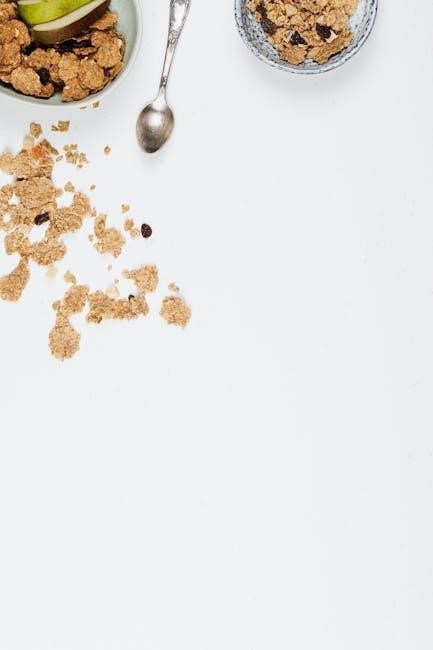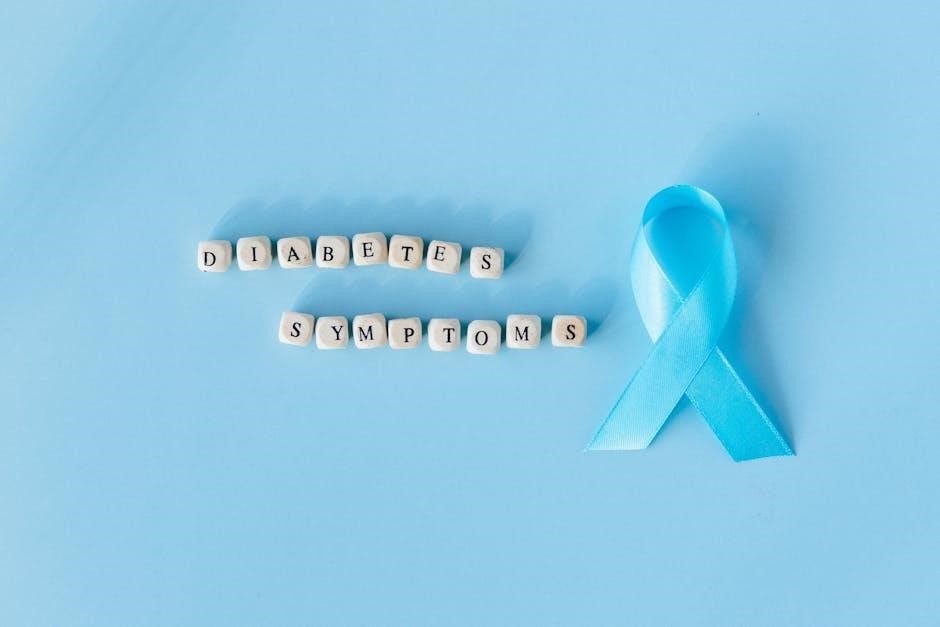The Blood Type B Negative Diet focuses on foods that promote health and well-being for individuals with B-negative blood type. It emphasizes lean meats, low-fat dairy, and certain grains, while avoiding foods that may trigger health issues. This personalized approach, based on Dr. Peter D’Adamo’s research, helps improve digestion, boost energy, and support overall wellness. By following this diet, individuals can better manage weight, reduce inflammation, and enhance their immune system. The diet is tailored to specific nutritional needs, ensuring optimal health outcomes for B-negative blood type individuals.

Overview of the Blood Type Diet Concept
The Blood Type Diet Concept, developed by Dr. Peter D’Adamo, is a personalized nutrition approach tailored to an individual’s blood type. It suggests that people with different blood types metabolize food differently due to variations in digestive enzymes and gut microbiota. For Blood Type B Negative individuals, this diet focuses on selecting foods that align with their unique biological profile to optimize health and energy. The concept is based on the idea that certain foods can either enhance or disrupt the body’s natural functions, depending on blood type. While the diet emphasizes beneficial foods, it also identifies those that may cause inflammation or digestive issues. By adhering to this plan, individuals can potentially improve their overall well-being and reduce the risk of chronic diseases. The diet’s core principle is to eat in harmony with one’s blood type for better health outcomes.
Importance of Adhering to a Blood Type B Negative Diet
Adhering to a Blood Type B Negative Diet is essential for optimizing health and preventing potential health issues. This personalized approach helps individuals avoid foods that may cause inflammation, digestive discomfort, or other adverse reactions. By selecting foods compatible with B-negative blood type, individuals can enhance their immune system, improve energy levels, and reduce the risk of chronic diseases. The diet is designed to align with the body’s natural chemistry, promoting efficient nutrient absorption and overall well-being. Ignoring dietary recommendations may lead to suboptimal health outcomes, such as weight gain, fatigue, or increased susceptibility to illnesses. Following the Blood Type B Negative Diet ensures that the body functions at its best, supporting long-term health and vitality. Consistency and awareness of food choices are key to reaping the benefits of this tailored nutritional plan.

Beneficial Foods for Blood Type B Negative

Blood Type B Negative individuals benefit from a diverse diet including lean meats, certain seafood, low-fat dairy, specific grains, fruits, vegetables, nuts, seeds, and oils, supporting overall health and digestion.
Meat and Poultry
For Blood Type B Negative individuals, lean meats and certain poultry options are highly beneficial. Lamb, beef, and venison are excellent choices, as they are easily digested and provide essential nutrients. Bacon, in moderation, is also considered beneficial. However, chicken, duck, and pork should be avoided, as they may cause digestive discomfort or other health issues. Rabbit and mutton are also recommended, while ham and quail are less ideal. This dietary approach ensures that proteins are metabolized efficiently, supporting overall health and energy levels. By focusing on these specific meats and poultry, individuals with Blood Type B Negative can maintain a balanced and nutritious diet that aligns with their unique physiological needs.
Seafood
For individuals with Blood Type B Negative, certain seafood options are highly beneficial while others should be avoided. Cod, carp, and anchovy are excellent choices, as they are considered highly beneficial and support overall health. These fish are rich in nutrients and align well with the digestive system of B-negative individuals. However, other seafood like shrimp, lobster, and crab should be avoided, as they may cause adverse reactions or hinder optimal health. Caviar can be consumed in moderation but should not be overeaten. By incorporating the right seafood into their diet, B-negative individuals can enjoy improved digestion, increased energy levels, and a reduced risk of inflammation. This tailored approach ensures that seafood intake is both enjoyable and health-promoting, fitting seamlessly into the Blood Type B Negative dietary framework.
Dairy and Eggs
Dairy and eggs play a significant role in the Blood Type B Negative Diet, as they are considered highly beneficial. Cottage cheese, butter, feta, goat cheese, and yogurt are excellent choices, providing essential nutrients and supporting digestive health. Eggs are also highly recommended, offering a rich source of protein and energy. These dairy products are well-suited for B-negative individuals, as they are easily metabolized and help maintain overall wellness. It’s important to opt for low-fat or unsweetened varieties to avoid unnecessary calories and potential inflammation. Avoiding processed or high-sugar dairy products is crucial, as they may hinder the benefits of the diet. Incorporating these foods into your meals can enhance your energy levels, improve digestion, and support immune function. Moderation is key, ensuring a balanced intake of dairy and eggs to maximize their health benefits while adhering to the Blood Type B Negative dietary guidelines.
Grains
Grains are a staple in the Blood Type B Negative Diet, offering essential nutrients and energy. Oats, quinoa, basmati rice, brown rice, buckwheat, millet, amaranth, couscous, and spelt bread are highly compatible and beneficial. These grains are rich in fiber, vitamins, and minerals, providing sustained energy and supporting digestive health. They are also easier to digest compared to other grain options, making them ideal for B-negative individuals. Incorporating these grains into meals helps maintain a balanced diet and promotes overall wellness. Avoiding harmful grains like corn, wheat, and barley is crucial, as they can trigger inflammation and slow metabolism. By focusing on the recommended grains, individuals can enjoy a nutrient-rich diet that aligns with their blood type. This careful selection ensures optimal health benefits and supports the body’s natural functions. Grains play a vital role in the Blood Type B Negative Diet, offering both nourishment and energy for daily activities.
Fruits
Fruits play a vital role in the Blood Type B Negative Diet, offering essential vitamins, minerals, and antioxidants. Tropical fruits like pineapple, papaya, and mango are highly beneficial, as they support digestion and immune function. Apples, bananas, grapes, and figs are also recommended, as they provide natural energy and promote overall health. These fruits are rich in fiber, which aids in maintaining a healthy digestive system. Incorporating a variety of fruits into the diet helps balance nutrient intake and supports the body’s natural functions. However, moderation is key, as excessive sugar consumption can lead to energy fluctuations. By focusing on the recommended fruits, individuals with Blood Type B Negative can enjoy a diet that is both nourishing and delicious. This selection ensures optimal health benefits and aligns with the dietary needs of B-negative individuals, supporting their overall wellness and vitality.
Vegetables
Vegetables are a cornerstone of the Blood Type B Negative Diet, providing essential nutrients and promoting overall health. Leafy greens like spinach, kale, and collard greens are highly beneficial, as they are rich in iron and vitamins. Root vegetables such as sweet potatoes, carrots, and beets are also recommended, offering natural sugars and fiber. Cruciferous vegetables like broccoli, cauliflower, and Brussels sprouts support detoxification and immune function. These vegetables help maintain healthy digestion and energy levels, which are crucial for B-negative individuals. Incorporating a variety of colorful vegetables ensures a balanced intake of vitamins and minerals. Additionally, vegetables like zucchini, cucumbers, and bell peppers are excellent choices, as they are easy to digest and provide hydration. By focusing on these vegetables, individuals with Blood Type B Negative can enhance their diet’s nutritional value and support their body’s unique needs. This selection promotes optimal health and aligns with the dietary requirements for B-negative blood type.
Nuts, Seeds, and Oils
Nuts, seeds, and oils play a significant role in the Blood Type B Negative Diet, offering healthy fats and essential nutrients. Highly beneficial options include olive oil, flaxseed oil, and pumpkin seeds, which support heart health and digestion. Sunflower seeds, sesame seeds, and almonds are also recommended for their nutritional value. These foods provide sustained energy and help maintain a balanced diet. Neutral choices like walnuts and pecans can be consumed in moderation, while coconut oil is noted for its versatility in cooking and health benefits. Avoiding certain oils like corn and soybean oil is advised, as they may not align with the dietary needs of B-negative individuals. Incorporating these nuts, seeds, and oils enhances the diet’s effectiveness, promoting overall wellness and supporting the body’s unique requirements. They are integral to maintaining a balanced and nutritious eating plan tailored for Blood Type B Negative individuals.

Foods to Avoid for Blood Type B Negative
For individuals with Blood Type B Negative, certain foods should be avoided to maintain optimal health and prevent potential health issues. These include specific meats like chicken, pork, and rabbit, as well as seafood such as shrimp, crab, and lobster. Dairy products like ice cream and blue cheese should also be limited. Grains like corn, wheat, and buckwheat are not recommended, and legumes such as lentils and peanuts should be avoided. Processed foods, sugary snacks, and certain oils like corn and soybean oil are also on the list of foods to avoid. These foods can trigger inflammation, digestive discomfort, and other health problems. By eliminating these from the diet, individuals with Blood Type B Negative can better manage their health and ensure they are fueling their body with the right nutrients. Avoiding these foods is crucial for maintaining a balanced and beneficial eating plan.

No Responses